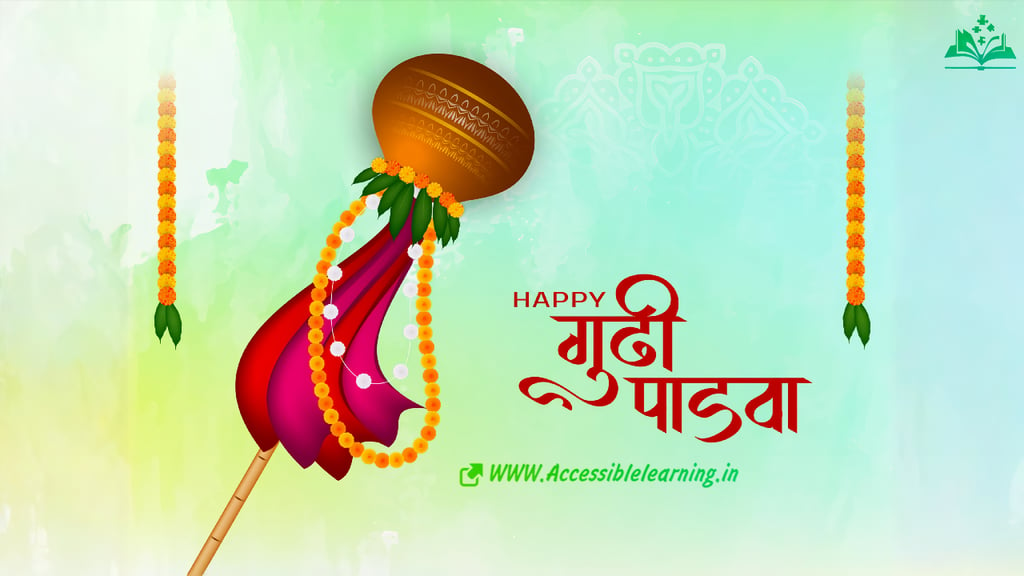
Gudi Padwa: A Grand Celebration of New Beginnings and Triumph
Gudi Padwa, the vibrant Maharashtrian New Year, is a festival of new beginnings, prosperity, and victory. Discover its significance, historical trivia, mythological legends, worldwide celebrations, and modern-day relevance in this in-depth guide.
CULTURE/TRADITIONEVENT/SPECIALINDIA/BHARATCELEBRATION/FESTIVALS
Sachin K Chaurasiya
3/11/20254 min read


Gudi Padwa/गुडी पडवा is a vibrant and auspicious festival celebrated in Maharashtra, marking the beginning of the traditional Hindu New Year. This festival falls on the first day of Chaitra month in the Hindu lunisolar calendar, usually in March or April. It holds deep cultural, religious, and historical significance, bringing together communities in a grand celebration of new beginnings, prosperity, and victory.
Significance of Gudi Padwa
Gudi Padwa is not just a New Year celebration; it carries profound historical and mythological importance. According to Hindu beliefs, this day marks the creation of the universe by Lord Brahma. It is also associated with Lord Rama’s victory over Ravana and his triumphant return to Ayodhya after 14 years of exile. Additionally, it is believed to be the day when the great Maratha warrior Chhatrapati Shivaji Maharaj/छत्रपति शिवाजी महाराज raised the Gudi (victory flag) as a symbol of his victories.
In a broader sense, the festival represents triumph over evil, prosperity, and the arrival of spring—a time of growth and renewal. Farmers also consider this day highly auspicious as it marks the beginning of the harvest season, with fresh crops like mangoes and neem blossoms playing a significant role in rituals.
Gudi: The Symbol of Victory and Prosperity
A significant aspect of Gudi Padwa is the hoisting of the Gudi, a decorative flag-like arrangement placed outside homes, on balconies, or rooftops. The Gudi is made up of:
A bright silk cloth (usually saffron, yellow, or green) tied to a bamboo stick.
A neem and mango leaves garland symbolizing health and good fortune.
An upturned silver or copper pot placed at the top.
Flowers and sugar garlands.
The Gudi is believed to ward off evil, bring prosperity, and invite divine blessings into the household. It also represents victory, honor, and the welcoming of the New Year with optimism and joy.


Traditional Celebrations and Rituals
Cleaning and Decoration: Homes are thoroughly cleaned, and entranceways are decorated with beautiful rangoli designs, flowers, and mango leaves to attract positivity and good luck.
Gudi Hoisting: Families hoist the Gudi outside their homes, praying for prosperity, health, and happiness.
Special Prayers and Offerings: Devotees visit temples to seek blessings from deities, especially Lord Vishnu and Lord Rama.
Traditional Attire: People wear new clothes; women often drape elegant Nauvari sarees, while men wear Kurta-Pyjama or Dhoti.
Feasting on Special Delicacies: The festival is incomplete without relishing traditional dishes like:
Puran Poli (sweet flatbread stuffed with lentils and jaggery)
Shrikhand-Puri (a sweet yogurt dish with deep-fried bread)
Kokum Sherbet (a refreshing drink)
Bitter Neem and Jaggery Mixture (symbolizing life’s mix of joy and sorrow)
Sakhar Bhaat (sweet saffron rice)
Poori Bhaji (deep-fried bread with spiced potato curry)
Cultural Processions: In Maharashtra, grand processions, ‘Shobha Yatras’ featuring traditional dance, music, and community participation, take place.
Historical Trivia & Lesser-Known Facts
Did you know? The term ‘Padwa’ comes from the Sanskrit word Pratipada, meaning the first day of a lunar month.
Some historians believe that Gudi Padwa was celebrated during the time of the Satavahana dynasty, even before the Marathas.
The Gudi is also called ‘Brahma Dhwaj’, symbolizing Lord Brahma’s role in the creation of the universe.
King Vikramaditya is believed to have started the Vikram Samvat calendar on this day.
Mythological Legends
Creation of Time and the Universe: Hindu mythology states that Brahma Ji created the universe on this very day and introduced timekeeping.
Victory of Ram Ji: This day is believed to commemorate Ram Ji’s victory over Ravana and his return to Ayodhya.
Indra’s Victory: Some scriptures mention that Indra Ji defeated demon Vritra and restored rainfall and prosperity on Gudi Padwa.
Astrological & Scientific Significance
From an astrological perspective, Gudi Padwa marks the transition of the Sun into the Aries zodiac sign, signifying new beginnings and positive changes. Scientifically, this time of the year sees a shift in seasons, where spring sets in, trees bloom, and nature rejuvenates, making it a symbolic period of renewal and growth.
How Gudi Padwa is Celebrated Across the World
Gudi Padwa is celebrated not only in Maharashtra but also by Maharashtrians and Indians worldwide.
In Dubai, the UK, and the USA, large Maharashtrian communities organize processions, cultural events, and temple prayers.
Indian temples in Australia and Canada conduct special Gudi Padwa rituals, with devotees hoisting the Gudi and singing bhajans.
Many Indian restaurants and cultural organizations host Gudi Padwa feasts and musical performances abroad.
Regional Variations of Gudi Padwa
While Gudi Padwa is predominantly celebrated in Maharashtra and Goa, similar festivals mark the New Year in other Indian states:
Ugadi in Karnataka, Andhra Pradesh, and Telangana
Cheti Chand among the Sindhi community
Navreh in Kashmir
Chaitra Navratri begins on the same day in North India
Environmental & Modern-Day Considerations
Encouraging eco-friendly celebrations, using biodegradable materials for the Gudi and natural colors for rangoli.
Digital celebrations are on the rise, with people attending online satsangs and sharing festive greetings via social media.
More people are choosing sustainable practices by donating food and essentials to the needy rather than extravagant celebrations.
Gudi Padwa is a festival of hope, celebration, and triumph. It signifies the victory of good over evil, the arrival of prosperity, and the joy of new beginnings. Whether through the symbolic Gudi, delicious food, or grand processions, the essence of this festival lies in its spirit of renewal and togetherness.
As you celebrate Gudi Padwa this year, embrace the festive energy, cherish your roots, and step into the New Year with happiness and success! Gudi Padwa Shubhakaamanaaye! (गुड़ी पड़वा शुभकामानाएं) (Best wishes for Gudi Padwa!)
Subscribe To Our Newsletter
All © Copyright reserved by Accessible-Learning Hub
| Terms & Conditions
Knowledge is power. Learn with Us. 📚


